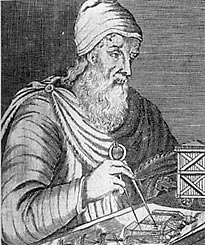.jpg)
The "absent-minded genius" is one of the most powerful stereotypes in science. But where did it come from? Perhaps its earliest appearance is in descriptions of the death of Archimedes. The great mathematician and inventor was supposedly killed during the Roman conquest of his home city Syracuse - despite orders to keep him alive - when he refused to break away from some geometry that he was studying.
Now an Italian historian, Cettina Voza, is suggesting that this image of Archimedes was invented by the Romans to hide the fact that they targeted him deliberately. In doing so, they created a stereotype that still colours how we see scientists today.
It's hard to know what really lies behind ancient historical accounts - most of them were written long after the episodes concerned by authors who did not witness events firsthand. Interpreting them is always going to involve a fair bit of speculation and personal opinion. But I think Voza's arguments are fascinating (and would love to hear what others make of them) so I'll summarise them here.
A Roman army led by General Marcellus attacked the city of Syracuse (in today's Sicily) in 214 BC, after the city's king switched allegiance from Rome to its rival Carthage. It should have been a quick victory but the Romans weren't prepared for Archimedes' fearsome war machines. His inventions, such as catapults, siege towers and a giant claw for attacking ships (and who knows, maybe even a flaming cannon) kept the Romans at bay and turned their attack into a long and exhausting siege.
Finally, in 212 BC, Marcellus's men found a weak spot in the Syracusans' defences and swarmed into the city. According to ancient accounts, Marcellus was so impressed by Archimedes' abilities that he had ordered him to be kept alive. Yet the mathematician was killed that day by one of Marcellus's soldiers.
Cicero says that Archimedes was so focused on tracing signs in the dust that he did not notice the Roman attack. Likewise, Silius Italicus says Archimedes "was intent on studying geometrical figures traced in the sand, not at all disturbed by the terrible ruin of the city". Valerius Maximus says he was killed because he carried on tracing figures on the ground instead of obeying the soldier's order to give his name.
These authors also say that when Marcellus found out that Archimedes had been killed, he was "supermoleste tulisset" (he bore it with the greatest difficulty), helped out the grieving relatives, and arranged a suitably grand funeral.
At a conference on Archimedes held in Syracuse last June (the proceedings of which have now been published by Springer), Voza suggested that these stories have more to do with propaganda than reality. She believes Archimedes' killing was absolutely intentional, and describes it as a "state-sponsored assassination".
She has a couple of reasons for doubting the above versions of events. First, she points out that Archimedes was famous in the ancient world and presumably very recognisable. So she questions whether a Roman soldier would have been so quick to disobey the orders to spare him. Such a transgression would have resulted in serious punishment (indeed, in one version of the story, the soldier was killed for it).
Second, she questions whether Archimedes would really have been so oblivious to reality. The scientist was supposedly at the heart of Syracuse's defence, having created the advanced weapons that kept the Romans at bay for so long. Shouldn't he have been slightly quicker to catch on that the city was being conquered?
Voza argues that because of his role in the siege, Archimedes would have been one of the Romans' main targets when they took Syracuse. She believes that in an early example of political spin, pro-Roman sources later embellished the story of his death, to justify the fact that the Romans had killed the greatest scientist of the ancient world, and to portray Marcellus as an honourable and cultured man.
But in creating this new version of events, she says, the Romans also invented and exploited the image of a genius divorced from reality - an image that has persisted as long as the memory of Archimedes himself. Their story, she says, "creates and establishes for the future expectations of what science should be: pure speculation and theory, divorced from any practical application".
Intriguingly, Voza mentions an alternative source of information about Archimedes' death: Dio Cassius (c. 155-235 AD). Tracing his version of events illustrates something of the difficulty of relying on ancient historical accounts. We don't have his description of the siege directly, but it was paraphrased by the 12th-century authors John Zonaras and John Tzetzes. In turn, Dio's source was Coelius Antipater, who lived very close to the time of the siege of Syracuse, and based his account on writers who supported the Carthaginians.
These accounts are similar to the more popular ones described above but with a few subtle differences. For example, when surprised by the soldier in his house, Archimedes apparently said in anger "my head, but not my drawing!" The advancing soldier told him to move away from the drawing, then killed him. Tzetzes's account adds that Archimedes shouted, "somebody give me one of my machines", presumably to defend himself.
Stubborn, perhaps, but hardly absent-minded. Voza reckons this is a more plausible description of the man who was solely responsible for the strenuous defence of his city. "This offers us a different vision of Archimedes," she says. "This time angry, still immersed in defence projects, and ready to take material action against the enemy."
We'll never know what really happened. But I rather like this new image of a forceful, battle-ready Archimedes. Wouldn't it be nice if he could finally conquer the stereotype of the absent-minded professor.